Leading Digital Inclusion in Salt Lake City: Interview with SLCPL's Peter Bromberg
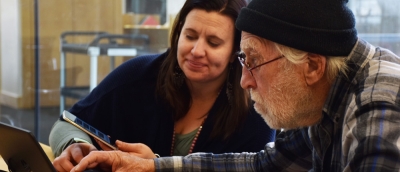

Pictured: SLCPL Digital Inclusion Coordinator Shauna Edson helping a patron during a digital literacy drop-in program
This October 16-18, Salt Lake City Public Library will serve as a host for ULC's 2019 Forum: Preparing to Lead on AI + Digital Citizenship. ULC reached out to SLCPL's Executive Director Peter Bromberg to discuss Salt Lake City's unique digital inclusion needs and how the library is leading efforts to strengthen its communities in the digital age. Read the full interview below!
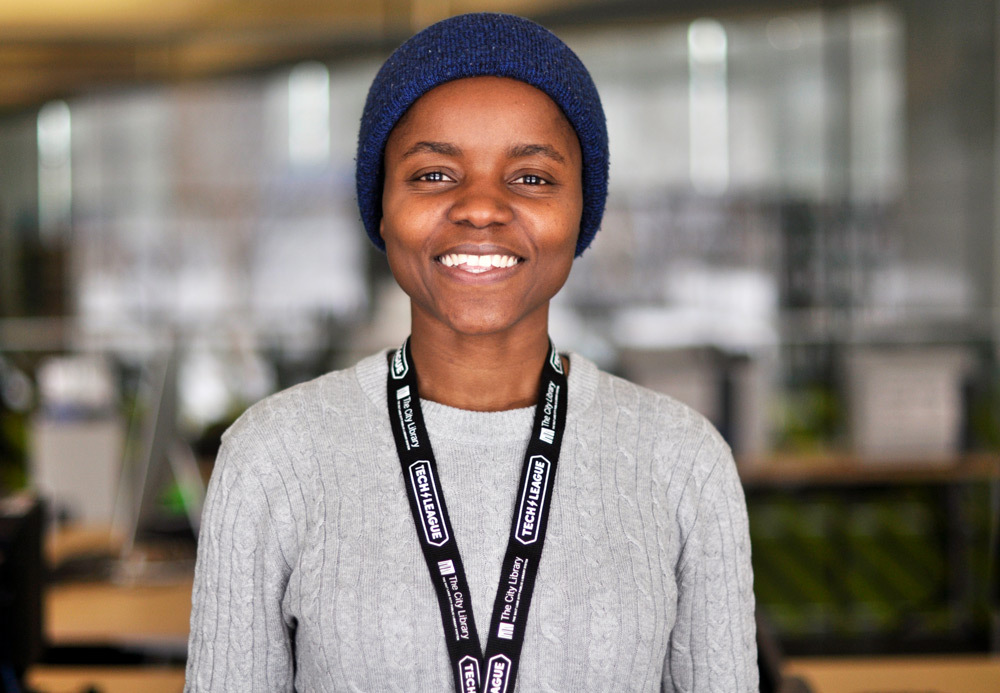
“I helped a library patron fill out a job application. This included signing up for the portal that he needed to sign up for in order to submit his application. This experience stood out because it reminded me that not everyone has the opportunity to pick up certain skills and made me want to play my little part in bridging the skills gap, however I can.” — Jane Ullah, Tech League Volunteer
In 2018, Salt Lake City Public Library adopted a Strategic Roadmap, which explicitly recognizes the digital divide as a barrier to social equity. How does the library act as a digital inclusion leader in your community through its programs, services and outreach? What lessons can other libraries learn from your work in these areas?
The library has truly been a leader in Salt Lake City, building awareness of digital equity issues and strategically addressing these issues head-on. Our first significant step was to hire Shauna Edson as our "digital fellow," which we were able to do through a grant from the Nonprofit Technology Enterprise Network and funding from our Friends group. In Shauna's year as the library's digital fellow, she created the "Tech League" — a broad initiative to build a more digitally inclusive community through information, workshops, events, a volunteer program and classes. The Tech League's goal is to understand who in our community lacks internet access and to bring the library's resources and tools to those individuals to foster independence, connection and success in our digital world. Realizing that many patrons face barriers to visiting the library, the Tech League launched a "Laptop Discovery Kit" so that patrons may access the internet from wherever they are. The kits include a Chromebook and a wireless hotspot to enable access to reliable broadband. This program was a notable success and attracted additional funds from Google Fiber, allowing us to expand the number of laptops/hotspots in circulation.
By the end of Shauna's one-year fellowship, she recruited and trained over 30 volunteers who provided 1,000+ volunteer hours and assisted more than 1,000 patrons, facilitating digital literacy education by providing one-on-one assistance to library patrons and also helping to facilitate digital literacy workshops at community events. The library had also established numerous relationships with partners to better reach community members who are not coming into the library.
It was clear that Shauna's fellowship was having an immediate and noticeable impact and leading to many partnerships in the community, so we included funding in the FY18 budget to create a permanent digital inclusion librarian position. Shauna's work continued to be highly impactful, and we reclassed the position to be a system-wide service coordinator in FY19.
Under Shauna's leadership, the library continues to connect with organizations serving communities experiencing digital inequities and works collaboratively to create customized programs with partners in their locations. For example, we recently partnered with the micro-business center of the International Rescue Committee (IRC) to encourage and support refugees in becoming small business entrepreneurs. We also offered a recent workshop on how to use Square to take payments, which helped members of the refugee community offer their goods at the local farmer's market. Our Tech League volunteers are regularly working with IRC microbusiness clients one-on-one to help with tech needs involved in launching and running a business (i.e., running social media campaigns, setting up Etsy shops, etc.).
One of the biggest lessons we've learned is that addressing digital equity issues is a complex community challenge — and no single organization can address it alone. We have developed significant partnerships with Salt Lake City, Google Fiber, the Housing Authority, IRC, the Youth Resource Center (a homeless shelter for teens), senior centers, Salt Lake County Library and the Utah State Library. While we don't go it alone — we've found that the library was very well positioned to take a leadership role in the area of digital equity and inclusion.
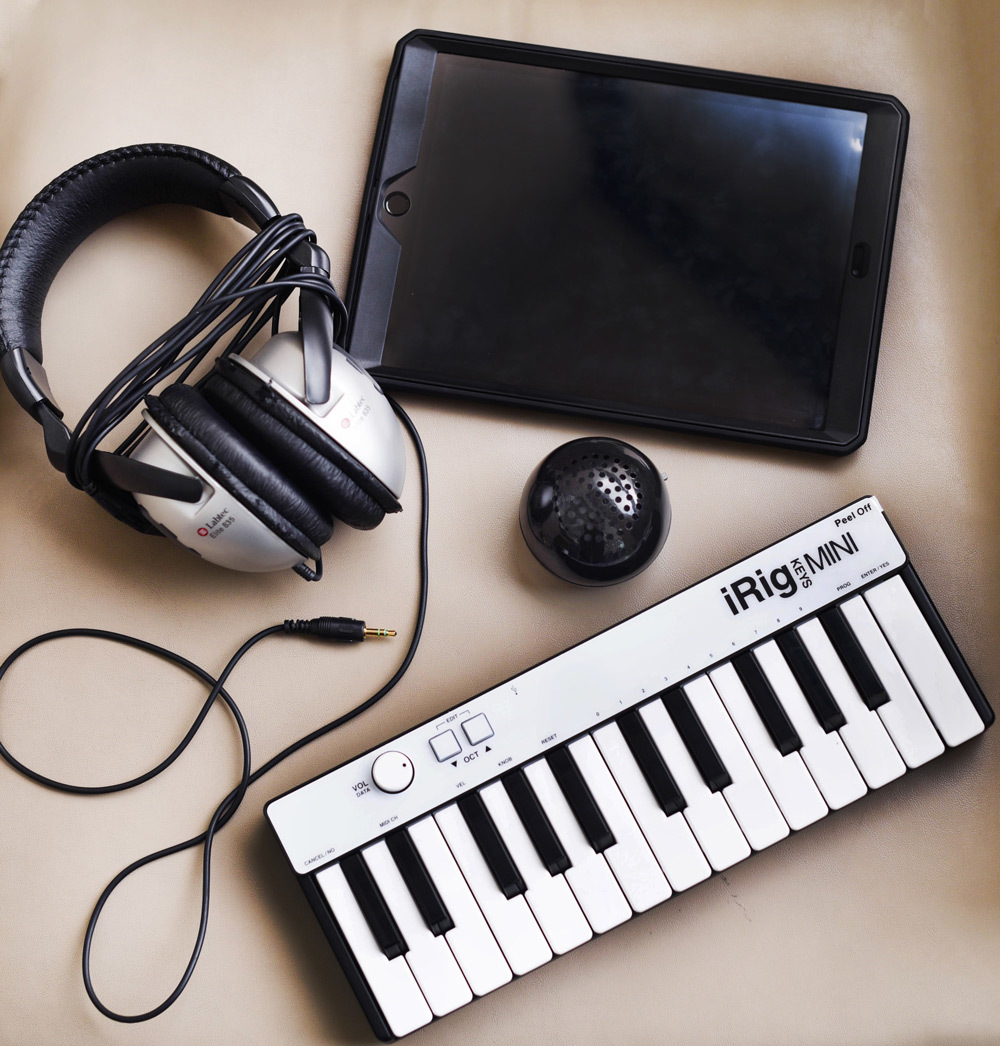
City Library’s Music Tech Kit
What are the unique characteristics of the Salt Lake City community’s needs for digital inclusion? How is the library evolving its thinking and services to address those specific needs, and how does the library plan to grow that role?
We actually have a relatively high connectivity rate in SLC as compared to other cities. Because we have more people with high-speed internet in their homes, we can broaden our focus and ask, "what does digital equity look like after access?" For instance, we are working to increase digital literacy and access to devices.
As our Digital Inclusion initiative evolves, we are starting to think more about how we can focus our learning modules around technology, such as how to use smartphones and teaching critical-thinking skills. We are also looking more at effective pedagogies — how to incorporate curiosity and play as learning strategies and build not just comfort, but a sense of fun and joy, which will increase the likelihood that learners will self-direct, experiment and learn outside of the computer lab. We also encourage a practical experiential approach to learning, inviting people to reflect on how a particular technology practically applies to their life; to school, work, etc.
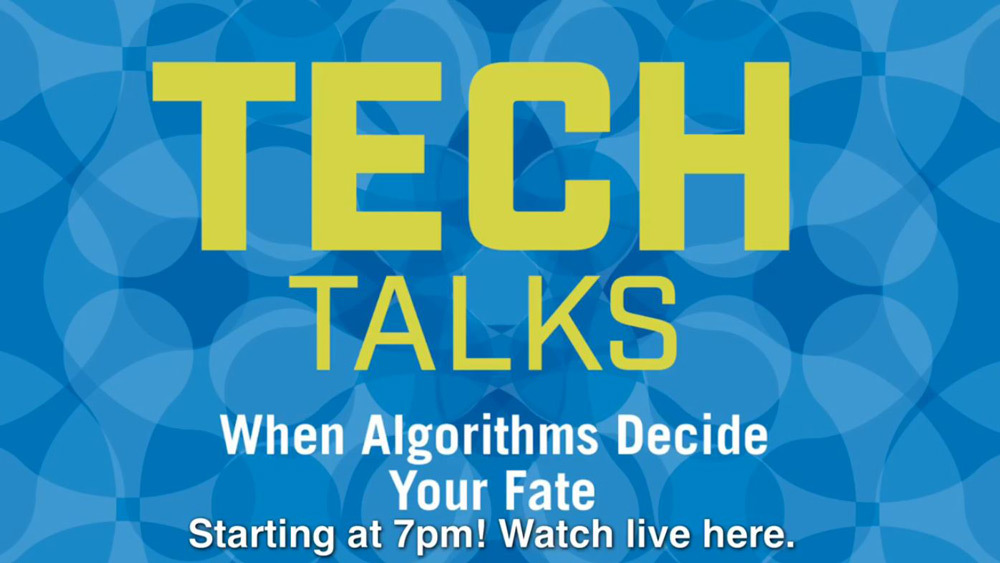
"Title slide for Facebook Live streaming of the library's Tech Talk, “When Algorithms Decide Your Fate”
How has the library’s high-level strategic planning around digital inclusion translated to changes in staffing or staff training?
First and foremost, we hired Shauna Edson as our digital fellow in 2017, and we have continued to expand her role from fellow to librarian to system-wide digital inclusion service coordinator. We are currently developing digital literacy staff competencies which will then be incorporated into job descriptions, and influence our approach to recruiting, hiring and training. This will ensure that staff across the organization are technologically literate and competent in key areas. We are already training staff on how to consistently approach technology instruction based on best practices.
We have also created "Show and Tech Kits" (borrowing this good idea from the smart people at Arapahoe Library District). The programming kits circulate among staff and contain equipment and lesson plans that allow any staff member to offer well-planned, high-quality technology workshops in or out of the library. The existing kits (with more to come) include:
- Virtual Reality Kit
- Digital Storytelling Kit
- APP Music Kit
- Stop Motion Animation Kit
- Ozobot Kit
- Turing Tumble Kit: High-tech, hands-on, STEM-based, learning tools that build logic, critical thinking skills and fundamental coding concepts
- Chromebook Mobile Lab: 10 Chromebooks that staff can use in or out of the library to teach user-training
- Tablet Kit: Designed to teach the basics of using a tablet and common apps
The kits and accompanying curriculum are designed to incorporate MIT's four P's (Peers, Projects, Passion and Play), which is a significant shift from the more traditional ways we taught Word classes.
Lastly, the library has created a "CAT3" Team (Community Access to Technology Team) — to help build and foster a system-wide view and approach to digital equity strategy and get buy-in and build internal understanding and support. The team has cross-departmental, cross-branch and cross-title representation to ensure that everyone across the organization has a chance to help contribute to our digital equity programming.
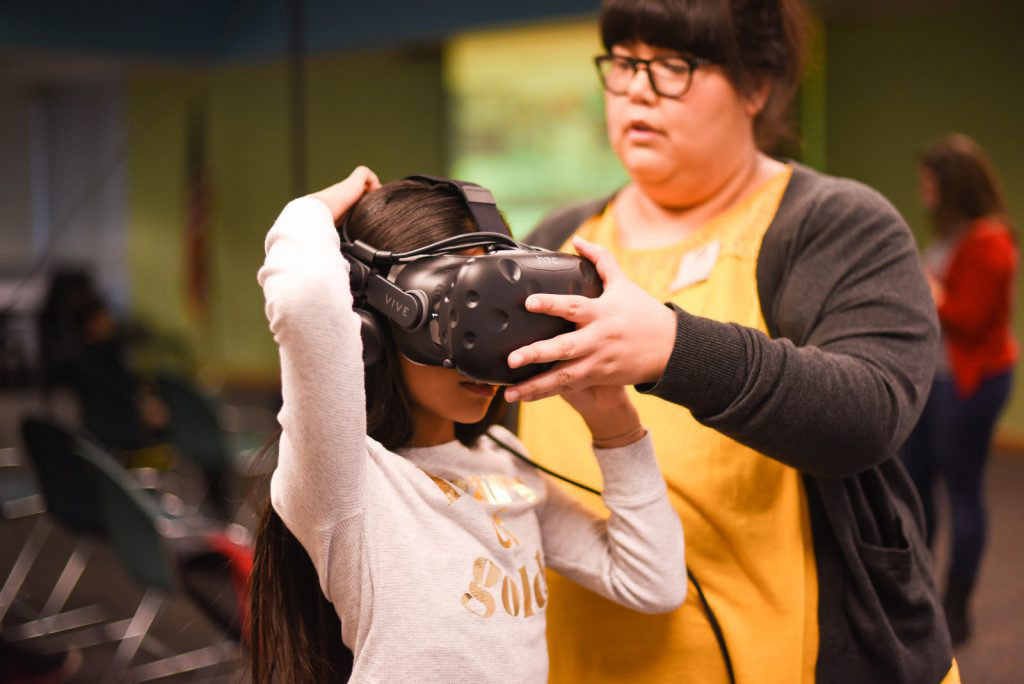
Salt Lake City Librarian Nancy Funes using the library's Virtual Reality “Show and Tech” kit to give kids a fun and educational VR experience
Last November, Salt Lake City Mayor Jackie Biskupski’s expressed the city’s commitment to ending digital access inequity. Could you speak to how the library is working with the city to make this commitment a reality?
The library has taken a significant leadership role in Salt Lake City with regard to building awareness and partnerships around digital equity policy and initiatives. As the library's digital inclusion coordinator, Shauna spearheaded the creation of Utah Community Connect (UCC), an alliance of partners including HUD, local Housing Authorities, a number of nonprofits, representatives from academia and city officials, all aligned to address digital equity issues in the city. After six months, as UCC gained momentum, they were able to get attention focused on the creation of a Salt Lake City digital inclusion policy.
UCC, under Shauna's leadership, worked closely with the city to host public awareness events that were designed to introduce policy ideas, foster community engagement and get feedback on the policy. Once the policy is finalized and officially adopted by City Council, we will work with the city to draft an official digital strategy plan. As Shauna is an advisor to the policy group of UCC, and by virtue of the library's status as an anchor for digital literacy, we expect to play a significant role in the development and execution of the city-wide digital strategy plan.
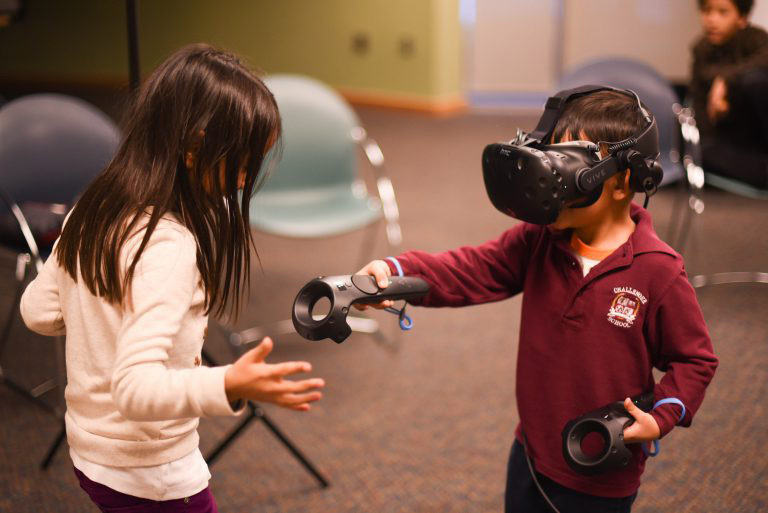
Fun with the VR Show and Tech Kit
What other local organizations/coalitions does the library partner with in order to lead digital equity?
Shauna Edson, the library's digital inclusion coordinator, is the chair of Utah Communities Connect (UCC), which is an alliance of multiple partners who endeavor to bring awareness and action to our communities concerning information communication technologies around access, devices and education. The alliance members collaborate on a mission to coordinate locally tailored solutions to address digital inequities. Alliance members include: Comcast Universal, ConnectHomeUSA, Google Fiber, Housing Authority of Salt Lake City, International Rescue Committee, Mobile Beacon, Salt Lake County Library, Salt Lake City Public Library, Salt Lake City Corporation, SLCC Community Writing Center, United Way of Utah County, U.S. Department of Housing and Urban Development, Utah Broadband Outreach Center, Utah Nonprofit Housing Corporation and the Utah State Library.
Additionally, the library partners with Community Learning Centers (CLCs) in the city. For example, the Glendale Community Learning Center works closely with parents and kids in the Latinx community. The Glendale CLC had a lot of activity, and a solid base of trusted relationships, so we embedded ourselves there to help support their high school completion program. We also support digital literacy by providing tech equipment and training. For example, we've brought Cricut die-cut machines to their sewing class, and we've brought ozobots to teach robotics and coding.
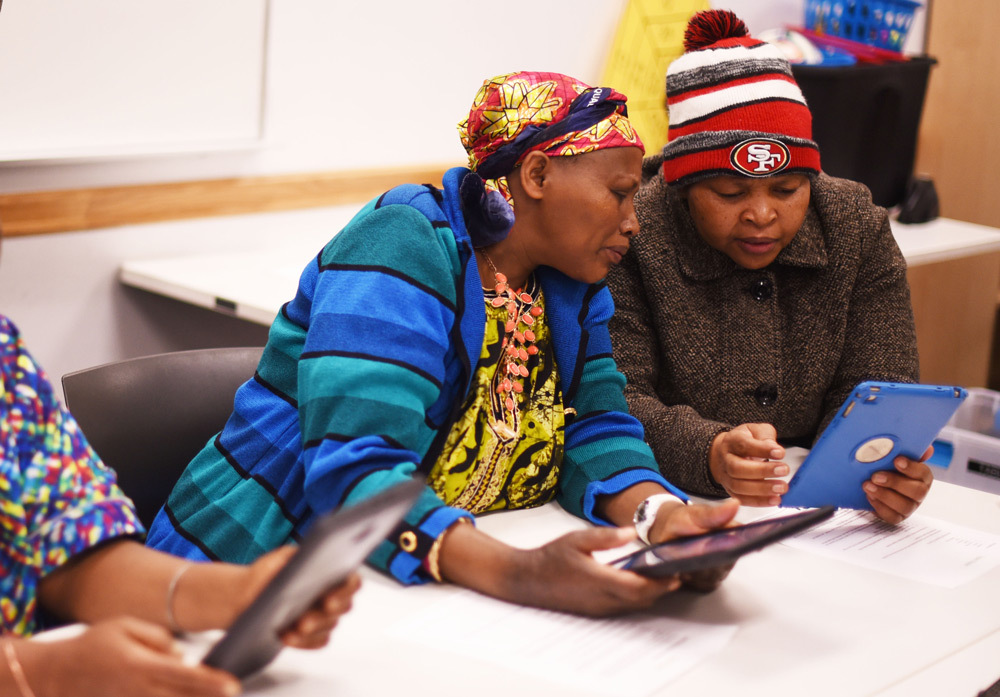
Library Tech League volunteers presenting a workshop on Square with the IRC
You serve on the board of EveryLibrary, an organization committed to building voter support for public libraries. How do you see the AI revolution intersecting with the library’s role in increasing civic engagement and fostering democracy?
This is a great question. I'm reminded of the quote attributed to Niels Bohr, "Prediction is very difficult, especially about the future." One of the big challenges, not just for libraries but for all organizations and institutions, is that the exponentially rapid pace of change is leading to an increasingly dynamic and complex reality — so it's hard to look around the bend and see how the AI revolution is going to impact the role of the public library in promoting a healthy civic space. Having said that though, I think the best we can do is to continually reconnect with our core values and ask ourselves how we can best express those values and bring them to life in meaningful ways given the state of the world this week, or this month. I expect that the manifestation of our commitment to the free exchange of ideas, to privacy, to civic engagement will continue to change as the times change. Certainly, we have a role to play in convening conversations, to bring public attention to some of the potential ramifications, both negative and positive, of AI, machine learning, data mining and the intersection of those related phenomena. The Salt Lake City Library has been partnering with the University of Utah's School of Computing on a series of Tech Talks to explore these issues. For example, we hosted a Tech Talk entitled "When Algorithms Decide Your Fate," where University Professor Suresh Venkatasubramanian introduced the audience to the concept of "Algocracy," a form of government where decisions are made (or assisted) by an algorithm — and suggested that this is the world that we are already living in. And part of the problem is that algorithms are generally black-boxed, and worse, they are likely to reflect, or even amplify, our implicit biases. So helping to bring awareness to these issues through programming, through civic dialogue, through the digital equity work we're doing with partners across the civic and educational spheres — there is definitely an important role for us to play.
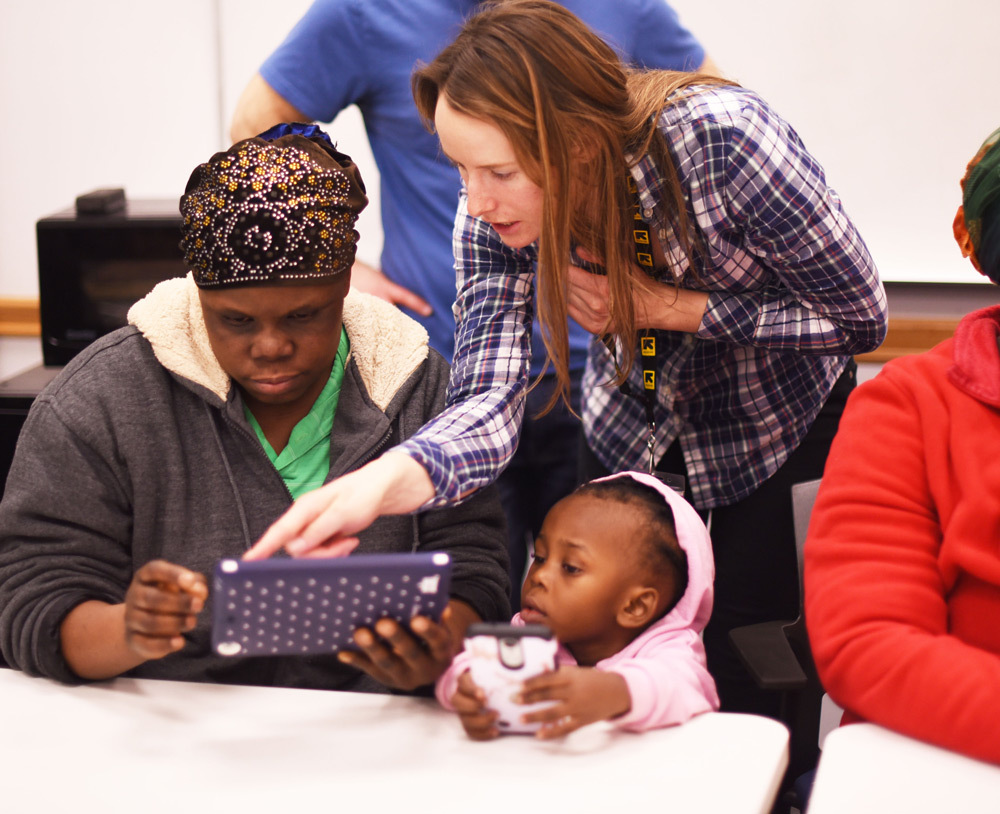
Library Tech League volunteers presenting a workshop on Square with the IRC
Looking ahead, what challenges to digital equity and inclusion do you see on the horizon for your library, and for the entire library field?
Well, every evolution in technology brings both challenges and opportunities, right? So internet access can be incredibly democratizing and a great equalizer, bringing the world's information to billions of people who historically have been without access to information and education. You can go online and learn a language, learn to code, read the classics. All of these activities that were, up until relatively recently, the purview of the privileged few. At the same time, there are always those who lag in terms of access or knowledge. I was literally reading a letter from a patron this morning thanking the library for providing both access to the internet and assistance using it. He and his wife recently lost their home and were experiencing homelessness due to a medical event, and he needed to apply for government benefits, find housing and find employment — and all of that required both access to the internet and a knowledge of how to use it.
Another example is the proliferation of voice command interfaces such as Alexa and Siri. It is predicted that voice-activated technology could replace keyboards within five years. Now that is fantastic in terms of helping people who may have physical limitations or loss of vision. But there are also obvious privacy concerns if our devices are always listening to us — what's happening to that data? How is it being mined and shared? What profiles are being developed, and what algorithms are being customized that will influence the information that is fed back to us? I think one of the challenges for libraries will be to remember that, as scary as these questions and possible futures are, there are positive applications and opportunities as well. For example, the good work that Nate Hill began in Chattanooga a few years ago working on the Open Chattanooga data project — partnering with the city to open up datasets and engage citizens to better interact with their government, create visualizations, apps and other projects to address community information needs. That kind of work — partnering with others to create a platform for residents to learn, create and engage — I think that's a good model for how we can move together into the future.
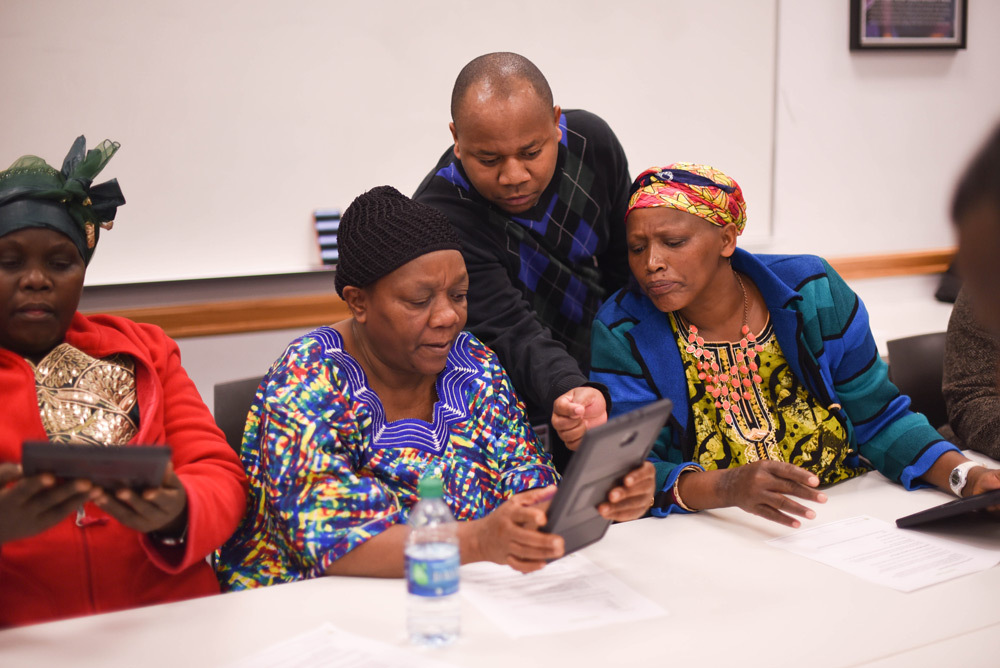
Library Tech League volunteers presenting a workshop on Square with the IRC
Finally, what do you hope library leaders will take away from their experience at your library and in Salt Lake City during their time at the 2019 ULC Forum?
First and foremost, I hope they take away how absolutely incredible Salt Lake City and the entire Salt Lake County valley truly is. I think people have a lot of misconceptions about SLC, and as New Jersey transplant I love and have great pride in my adopted home of more than five years. So I'm really excited for everyone who attends because they're going to be knocked out by the mountains, the proximity to nature, the culture, the food and of course the beauty of our libraries. And of course, I hope my colleagues will leave with their heads filled with new knowledge and creative ideas about libraries and AI, and their hearts filled with the sparks of new friendships and the joy and warmth of connection with old friends and acquaintances.
Peter Bromberg is the executive director of the Salt Lake City Public Library in Salt Lake City Utah. He is a recognized leader in public library advocacy work, serving as a board member for EveryLibrary, the first and only national organization dedicated to building voter support for libraries, as well as serving as the chair of the Utah Library Association Advocacy Committee.
Related Articles
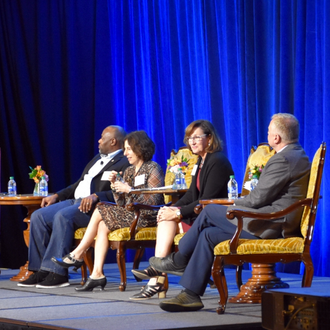
2019 ULC Forum Recap
Urban Libraries Council
Discover key highlights and takeaways from the 2019 ULC Forum: Preparing to Lead on AI and Digital Citizenship, which took place on October 16-18 in Salt Lake City.
Learn More
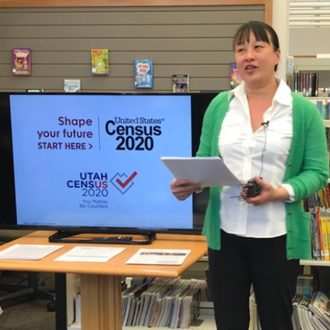
Salt Lake County Library Is Leading Its Community Forward in the Digital Age
Salt Lake County Library
Our 2019 ULC Forum host Salt Lake County Library is trailblazing digital citizenship and inclusion in the Salt Lake area. Learn how they are empowering their community to engage fully in the digital age!
